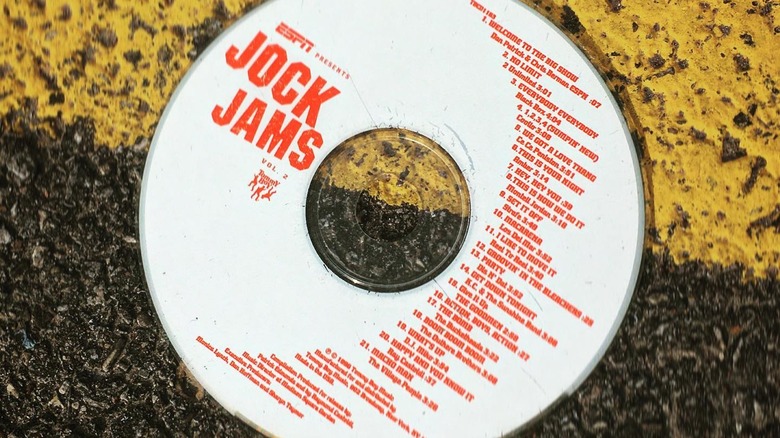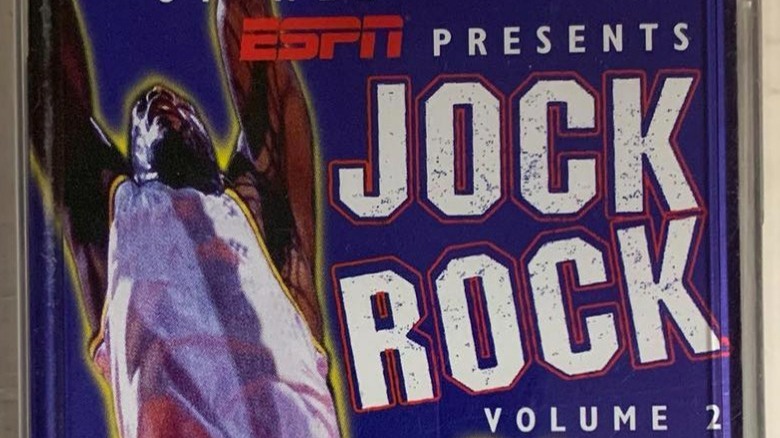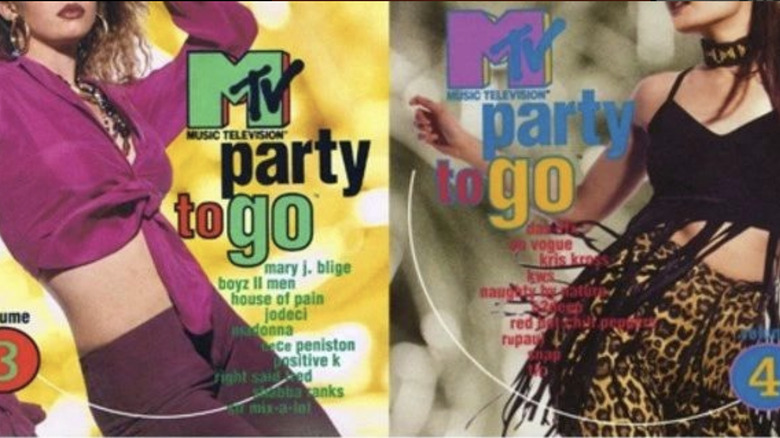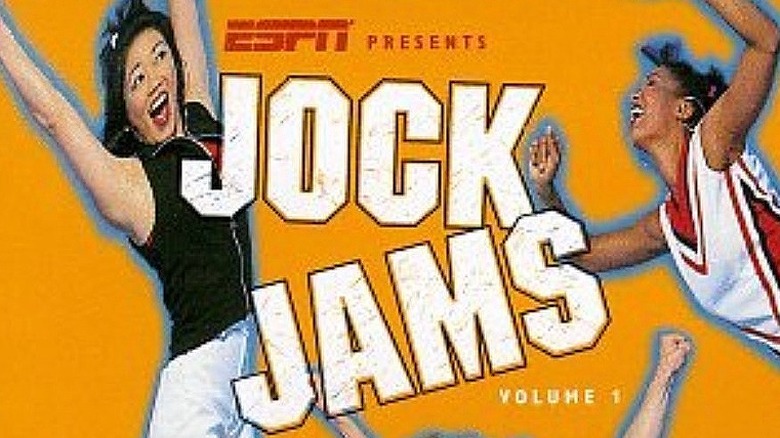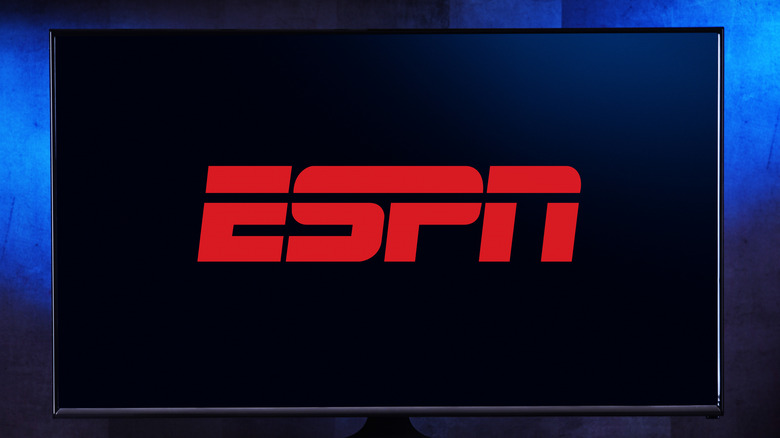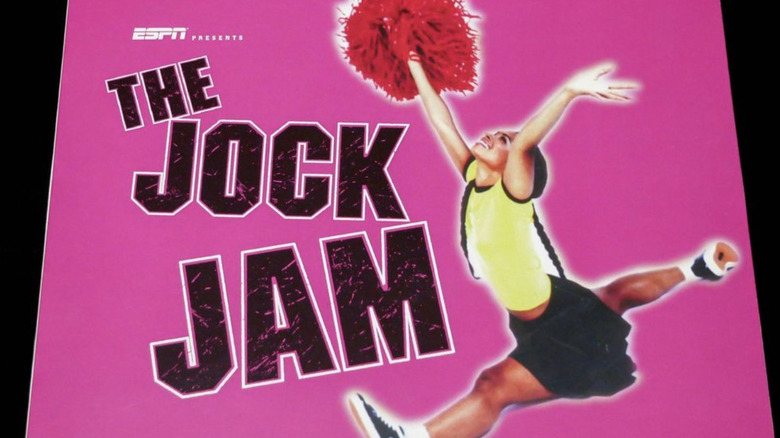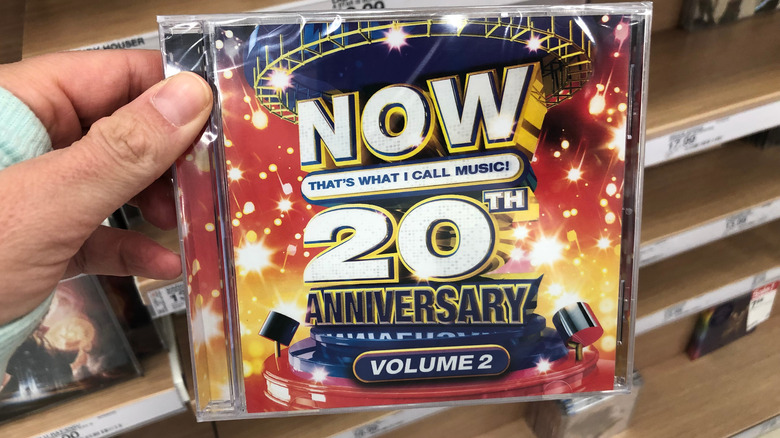What Really Happened To Jock Jams?
For decades, those who regularly attended big sporting events in arenas and stadiums were keenly aware of certain songs that would often play on the venue's loudspeakers. Those tunes pumped up the home-team crowd and the players alike, but it wasn't until the mid-1990s when all those classic, upbeat, inspiring rock and pop songs were definitively grouped together as a genre all their own. These songs, like Tag Team's "Whoomp! (There It Is)," the Village People's "YMCA," and Gary Glitter's "Rock and Roll Part 2," were, and still are, "Jock Jams."
In 1995, Tommy Boy Records released the first of several "Jock Jams" compilations on CD and cassette, the predominant musical formats of the time. Different "Jock Jams" collections filled the bins at record stores and the CD wallets of the millions of people who purchased them. Until one day, they were gone. Are you ready for this? Hey! It's the unbelievable rise and fall of "Jock Jams."
Before Jock Jams, there was Jock Rock
In 1994, after attending many New York Knicks games at Madison Square Garden, according to ESPN, Tommy Boy Records president Monica Lynch struck on the idea of compiling all the classic rock anthems that routinely played over the public address system. Seeking legitimacy from the world of sports, Lynch and other Tommy Boy representatives approached ESPN, the dominant name in cable TV sports broadcasting.
ESPN approved the proposal and in late 1994, Tommy Boy Records issued "Jock Rock, Volume 1," and in 1995, "Jock Rock, Volume 2." Both albums were essentially sports-arena greatest hits collections, featuring popular charge-up songs like "We Will Rock You" by Queen, "Blitzkrieg Bop" by the Ramones, "Takin' Care of Business" by Bachman-Turner Overdrive, and "Rock and Roll All Nite" by Kiss. According to the Roanoke Times, both collections would earn gold record certification sales awards from the Recording Industry Association of America (RIAA), representing sales of half a million copies each.
Executives at ESPN liked what Tommy Boy had done with the records and its brand name, but wanted more. "We looked for a way to expand the line," ESPN's Sharyn Taymor said. "We thought if we went to music that was more contemporary and urban, that was more sort of party music, that it may be something that would cut across a different demographic."
ESPN's Jock Jams was inspired by an MTV album
In 1994, "Jock Rock" peaked at No. 79 on Billboard's album chart, according to ESPN. "We knew we had something terrific," Sharyn Taymor, an ESPN executive in charge of merchandising and brand expansion, told the network's website. Inspired by K-Tel, a 1970s-era company that sold themed music compilations on vinyl and cassette via TV commercials, ESPN and "Jock Rock" partner Tommy Boy Records decided to launch a new line of CD collections. "Tommy Boy was more of a hip-hop, rap, and dance label, though, and they wanted to go more in that direction," Taymor said.
Indeed, Tommy Boy had been the original label of many pioneering hip-hop acts in the 1980s, including Queen Latifah and De La Soul. The label also had a lot of experience putting together compilations of upbeat, widely liked music. In 1991, Tommy Boy acted on behalf of MTV to produce and distribute "Club MTV Party to Go," the first of a decade-spanning series of "Party to Go" collections of non-stop dance music by various artists. According to MTV News, the first record (named for a now-defunct afternoon dance party TV show) was a charity album to benefit the American Cancer Society. It raised $12 million, proving there was money to be had in the 1990s by exploiting a very 1970s concept.
The '90s music climate helped propel sales of Jock Jams
A lot of people bought a lot of "Jock Jams" compact discs in the 1990s. The RIAA issued a platinum record award for "Jock Jams, Volume 1," certifying sales of a million copies. Two reasons why the series sold so well: a novel concept, and providing customers with the music they wanted when it was a little tough to acquire.
"Jock Jams" CDs aren't just wall-to-wall music. Between the frequently heard sports anthems are interstitials — bits from sportscasters, cheers, and crowd noise. "It [made you] feel like you were there," Tom Silverman, CEO of "Jock Jams" label Tommy Boy Records, told MTV News of the "Jock" format. "When you put it in the [context] of a game and tie it in with ESPN it made sense."
Even outside of their connection to sports, many of the songs on the "Jock Jams" albums are huge, classic hits. And in the 1990s, before the age of 99-cent downloads via the Apple Music Store or unlimited streaming for a low subscription fee, acquiring just one or two songs was relatively difficult. According to Slate, several major record labels stopped producing singles in the 1990s. If one wanted to buy a recording of just one song, new or old, they'd have to buy a whole album that may cost around $20. "Jock Jams" was an attractive bargain for record buyers, because virtually every song on every collection was a well-known hit.
ESPN is all over Jock Jams
"Jock Jams" was a series of CD compilations that collected some very well known literal crowd-pleasers from the '70s, '80s, and '90s that were commonly heard in sports venues. That's not the only sports connection — the music franchise was a brand extension of the ESPN cable network. At the time of the first "Jock Jams" releases in the mid-1990s, ESPN was enjoying a pop-culture moment, according to The AV Club. The network played up the "E" in its name (it stands for "entertainment") and promoted its "SportsCenter" hosts as celebrities with ready-made, repeatable catchphrases. Some of those phrases even appear on "Jock Jams" releases, as recorded by the likes of on-air personalities and sportscasters including Keith Olbermann, Dan Patrick, and Chris Berman.
Named in full, "Jock Jams" is actually "ESPN Presents Jock Jams," and the songs on the discs are interrupted with generic fan noise, cheerleaders, and other sounds one might hear in an arena to provide a fully formed, synthetic sports-viewing facsimile.
There's a Jock Jams hit single
Each entry in the assorted line of "Jock Jams" compact discs compiled and consolidated a lot of stadium music. In 1997, "Jock Jams, Volume 3" included a mash-up inside of that larger mash-up. The second-to-last cut on the packed 22-track album was something called "The Jock Jams Megamix," or alternately, "ESPN Presents The Jock Jam."
It was a medley made up of the most memorable, stadium-friendly sections of more than a dozen hip-hop, dance, and rock songs, most of which had been featured in full on the first "Jock Jams" CD released back in 1995. Slightly over three minutes in length, it also laid on the ESPN branding, incorporating recordings of the sports network's personalities and highlight show hosts delivering their famous catchphrases. Among them: Dan Patrick with "Simply en Fuego," Keith Olbermann with "Welcome to the big show," and Chris Berman's "He could go all the way!"
A throwback to a medley craze that had taken over the pop charts in 1981, "The Jock Jams Megamix" was a moderate pop radio hit. It peaked at #31 on the Billboard Hot 100.
Why Jock Jams had to end
Tommy Boy Records released a total of nine stadium music compilations. In addition to three ESPN-linked "Jock Rock" collections, the label shipped six volumes of "Jock Jams." The final entry, "Jock Jams: The All-Star Jock Jams," hit stores in 2001 and would mark the end of the series.
Cutting into the popularity of "Jock Jams," killing its sales and the franchise as a whole: the rival "Now That's What I Call Music" compilations. In the late 1990s and early 2000s, four major companies controlled virtually the entire music industry. Representatives from each got together to negotiate deals to license their artists' music for use on the "Now" discs, with terms that were more financially favorable than the ones offered by Tommy Boy for "Jock Jams." "Labels wouldn't license their songs to us when the 'Now' compilations started coming out under a collective revenue-sharing agreement," Tommy Boy CEO Tom Silverman told MTV News.
Furthermore, the "Jock Jams" were a victim of their own success. Over its run, the series had already collected virtually every major stadium hit. "It got harder toward the end to find songs," Silverman said. "We couldn't find 15 songs every year that were the new anthems."
